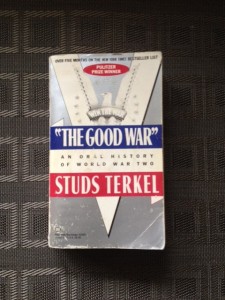So having a look at his little blog o’ mine, I’ve sort of realised I can’t keep doing updates on what is essentially a quite tedious process (writing). Well a tedious process to read about anyway.
Word counts grow, plot and characters expand, but essentially repeating, ‘oh, I’ve done some more stuff, it’s now up to 40k’ is probably not really a tonic for the troops, or the most thrilling way of keeping in touch with my readers.
So, time to expand! Fortunately I’m still reading plenty and playing a few games, so in the interests of keeping my hand in, I’ll also be doing a few additional short pieces, reviews, criticism, recommends and the like.
In writing the new Seraph book (now called Before the Flood and yup, just hit 40k’s worth, so nudging novel territory) I’ve also had a good excuse to delve into some fascinating World War 2 research and The Good War, by Studs Terkel is quite simply the finest I’ve read in a long while – probably ever. Not a surprise to find it won a Pulitzer and has been called ‘Incontestably one of the great human documents of all time.’ (Norman Corwin)
Terkel, I’d heard of before as a legendary much venerated hack, but last year I read and rather enjoyed Max Brooks World War Z. Brooks cited the venerable scribe as a major influence on his narrative technique, so curious to read more, I invested in a battered old copy of The Good War that came all the way over from the States and the remainder pile of the Miami American Bookstore.
Terkel’s gig is oral history: he ‘simply’ interviews people and then sets their story down on the page for you to read with apparently minimal intervention. However don’t underestimate the phenomenal journalistic skills this takes.
Although each interview apparently contains minimal questioning, Terkel is able to draw out fascinating insights and compelling stories with a lightness and deftness of touch that marks out the most gifted of interviewers. They read as naturally as if you were actually sitting there, sharing a cup of coffee and a cigarette with the speaker and hearing them prose on.
And what stories they are: The Good War features conversations with men and women from all levels and almost every theatre of the war, some different nationalities are represented but it’s mainly the American experience of it.
There are some truly staggering tales too: what it was like to grow up as a black child in Nazi Germany, whole sections on womens’ experience of the war and how the west coast Japanese-Americans were treated domestically (terribly).
Particularly powerful and shocking were the sections on how the US focus changed from fighting Germany to preparing to fight Russia very early on, the employment of ‘useful’ Nazis, US attitudes towards the dropping of the atomic bomb, the story of the Japanese survivors and the harrowing tales of US servicemen used as guinea pigs in atomic tests by their own government – and its subsequent denial of all responsibility.
This is a massive 500+ page book, yet it was so compelling I flew through it in a couple of weeks, snatching every spare moment to return to these absorbing accounts.
We’re so used to a standard, homogenised version of World War 2 that we forget that not every one saw it the war the same way at the time, or indeed shared the belief of inevitable victory. This variety of voices reminds us to take little of what we hear about history for granted.
These many divergent perspectives bring the conflict to life and weave an overall narrative more compelling than any single author or academic text book could possibly achieve.
A fascinating, thought-provoking and utterly compelling examination of whether world war 2 was indeed, a good war and a master class in narrative technique from its pre-eminent practitioner.
Comments are disabled for this post